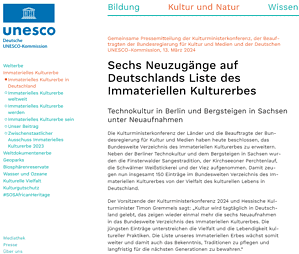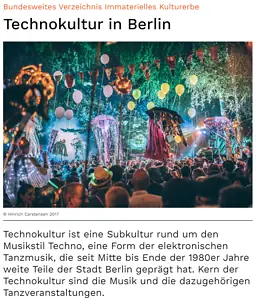
Berlin Techno Has Been Recognized as UNESCO Intangible Cultural Heritage
The recent recognition of Berlin’s techno scene as part of Germany’s cultural heritage by the German Culture Ministry and UNESCO Commission marks a monumental milestone in cultural history. This decision pays homage to the profound influence and distinctive role that techno music has played in defining Berlin’s cultural landscape and transforming it into a global epicenter for electronic music enthusiasts.
Berlin techno culture is recognized as a UNESCO World Heritage Site! 💥
This another milestone for Berlin techno producers, artists, club operators and event organizers. https://t.co/Bd1EnvJRN4
— clubcommission (@clubcommission) March 13, 2024
At the heart of this recognition is the acknowledgment of the techno scene‘s integral contribution to the city’s cultural identity. For years, Berlin has been synonymous with a thriving, pulsating techno culture, with its clubs and events drawing people from all corners of the world, seeking the unique energy and freedom that the city’s dance floors offer. The decision to include Berlin techno in the list of intangible cultural heritage is a testament to the genre’s ability to create a sense of community, belonging, and artistic expression.
Key organizations and figures within the techno community, such as Berlin’s Clubcommission and the non-profit Rave The Planet, have led the journey to this momentous recognition. Their relentless dedication and passion for techno have not only helped safeguard the genre’s legacy but have also played a pivotal role in advocating for its cultural significance. This collective effort underscores the collaborative spirit that defines Berlin’s techno scene, a quality that has been instrumental in its enduring appeal and influence.

(Source: You can access the full article of the UNESCO Germany Ministry here and here.)
The impact of techno on Berlin goes beyond mere musical preference; it’s woven into the city’s fabric, becoming a symbol of resilience, innovation, and unity. In the aftermath of the Berlin Wall’s fall, techno became the soundtrack to a newly reunified city, a beacon of hope, and a medium for expression during a time of significant change and uncertainty. The genre’s repetitive beats and hypnotic rhythms offered a space for reflection, celebration, and escape, helping to forge a new, forward-looking identity for Berlin.
This UNESCO recognition not only honors the past and present luminaries of the techno world but also secures a legacy for future generations to build upon. It highlights the cultural richness and diversity of Germany’s intangible heritage, placing Berlin’s techno scene alongside other treasured cultural expressions. The acknowledgment serves as a reminder of the power of music to transcend boundaries, connect individuals, and shape the cultural narratives of cities and nations.
In conclusion, the inclusion of Berlin’s techno scene in the list of cultural heritage is a resounding affirmation of the genre’s enduring impact and significance. It celebrates the spirit of innovation, community, and artistic freedom that techno embodies, ensuring that the vibrant beats and rhythms of Berlin will continue to inspire and unite people for years to come. This recognition is not just a victory for Berlin or the techno community; it’s a celebration of the universal language of music and its capacity to enrich our cultural landscapes and collective human experience.



